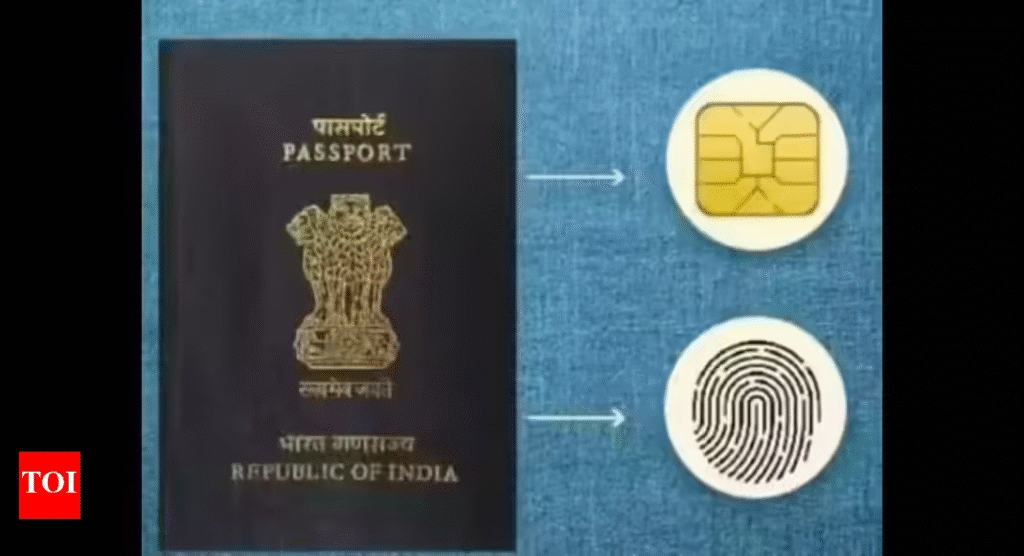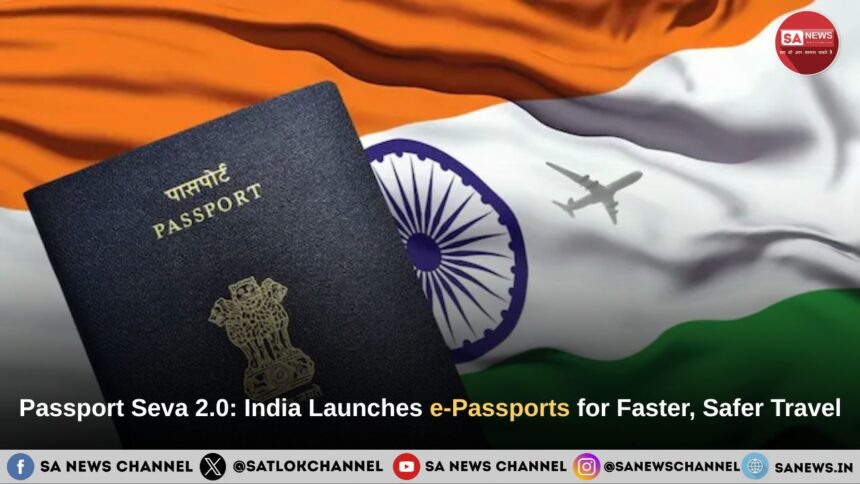India today changed the mode of travel documentation with the inception of Passport Seva 2.0 and the nationwide rollout of e-passports. Initiated on the occasion of Passport Seva Divas 2025 by External Affairs Minister Dr.S. Jaishankar, this initiative attempts to augment security, eradicate frauds and bring the Indian passport machinery in harmony with global best practices.
- The key highlights e-Passports
- What Is an e-Passport?
- Who Can Apply?
- Documents Required
- How to Apply for the e-Passport
- Advantages of e-Passport
- Where Are e-Passports Issued Now?
- Common myths and their respective clarifications
- What’s Next
- Maybe some tips for applicants?
- Future is Digital
- The Spiritual Passport
- FAQs about Passport Seva 2.0 (e-Passports)
- 1. What is Passport Seva 2.0?
- 2. What is an Indian e-passport?
- 3. Who can apply for e-passports in India?
- 4. Where are e-passports issued presently in India?
- 5. Are old passports still valid post-launch of e-passports?
- Connect With Us on the Following Social Media Platforms
Under the proposed program, faster and transparent issuance of passports shall be possible through implementation of newer technologies, digital interface, and wider availability of service centers. Soon, the ordinary applicants standing for new passports or re-issuance thereof; will be able to get chip-loaded e-passports anywhere in the country.
The key highlights e-Passports

- Launch of Passport Seva 2.0 and integration of the e-passport system
- Featured aspects of the e-passport and workings
- Stepwise application procedure along with required documents
- The eligibility criteria for citizens including minors
- Benefits: Increased security, faster immigration checks, and worldwide compliance
- List of Regional Passport Offices already granting e-passports
- Clarifications about the validity of old passports and the myths attached
- Expansion plan in the offing and some citizen-friendly suggestions
What Is an e-Passport?
During the time of normal passport booklets, one would wonder why just behind the rear cover lay nothing but an unusual electronic chip. This chip stores the holder’s personal data and biometric details such as a photograph or fingerprints in encrypted form. The document is then read contactlessly at airports, making the time for verification instant and the likelihood of forgery minimized.
Also Read: भारत में शुरू हुआ हाई-टेक ई-पासपोर्ट: अब हवाई यात्रा होगी तेज़, सुरक्षित और डिजिटल
E-passports bear this special golden symbol on the front cover to identify themselves to the traveller. The technology is in full compliance with ICAO standards and, hence, internationally accepted.
Who Can Apply?
- Any Indian citizen applying for a new passport or a reissue (due to expiry, damage, or exhaustion of pages) can request an e-passport.
- In cases where current passports are valid till the expiry date, immediate de-linking to the e-passport is not feasible.
- Any child below eighteen years of age can also apply for it; however, this would require the consent of the parents and addition of other forms.
Documents Required
Applicants will have to submit documents, which have so far been used in the case of a passport, of:
- Identification (like Aadhar, voter ID, driving licence, etc.)
- Proof of address (utility bill, rental agreement, etc.)
- Recent passport-size photographs (mandatory from September 2025) conforming to ICAO standards
- Consent documents for minors
How to Apply for the e-Passport

1. Register or log in to the official Passport Seva portal online.
2. Fill in the application form of the e-passport with the correct details.
3. Pay the fee online using a debit card, credit card, or net banking.
4. Book an appointment at the nearest Passport Seva Kendra (PSK), Post Office Passport Seva Kendra (POPSK), or Regional Passport Office (RPO).
5. Reach the centre with original documents for verification, biometrics capture, and photographs.
6. After successful verification, the passport is printed with the embedded chip and sent to the applicant’s registered address.
Advantages of e-Passport
- Enhanced security: Advanced encryption makes data manipulation and counterfeiting nearly impossible.
- Quick immigration: Verifications on-chip use less time at the counters of the airport.
- Accepted worldwide: Recognized under ICAO guidelines for a smooth travel abroad.
- Reliable data storage: Both Biometric and Identity Information is stored digitally and physically.
- Quick police verification: Mobile apps provide police officials with speedy address verification.
Where Are e-Passports Issued Now?
The rollout began in phases during April 2024. Currently, e-passports are being issued from Regional Passport Offices in Nagpur, Bhubaneswar, Jammu, Goa, Shimla, Raipur, Amritsar, Jaipur, Chennai, Hyderabad, Surat, and Ranchi. In Tamil Nadu, Chennai started issuing them from March 2025. More centres are being gradually added and a complete nationwide roll-out is expected by the end of 2025.
Common myths and their respective clarifications
- A passport is a travel document. Does it also mean that an old passport becomes invalid? No. Any previously issued passport remains valid up to the date of its expiry.
- Will there be an increase in fee? The fees for issuance of e-Passports will be the same as fees for normal and tatkaal applications at present.
- Is replacement of an existing one compulsory? Only expired, old, damaged, or completed passports are eligible for re-issue, all others may continue to be used.
- Can agents give any guarantee of faster e-passport service? Beware of touts-ONLY online booking through the official site and appointments at RPOs are valid.
What’s Next
The Ministry of External Affairs is planning to go further in strengthening the passport ecosystem by:
- Setting up more PSK and POPSKs all over India
- Integration of digital tools such as AI-enabled chatbots and cloud systems
- Making mPassport app more powerful in tracking status, booking appointments, and conduct police verification checks
- Ensuring all photographs submitted are by ICAO standards, so as not to cause any unnecessary delay
Maybe some tips for applicants?
- To avoid any problem, apply early-with an international trip to boot.
- The picture must be ICAO-compliant; this even applies before submitting the same.
- Always keep both originals and photocopies of the proofs of identity and address.
- The mPassport app proves helpful for checking status updates in real time.
- Never engage middlemen; use only the official Passport Seva website.
Future is Digital
The inauguration of Passport Seva 2.0 and the commencement of e-passport issuance can be rightly named as a milestone in this country’s heritage of travel documentation. With chip-based passports, Indian travelers get instantaneous verification in airports, prevention against the gross fraud of passports, and facilitated traveling abroad. While the current day passports shall remain valid, e-passports are what is set to secure India’s place as a modern, fast-track, and citizen-friendly mechanism for passports.
The Spiritual Passport
Just as a passport is essential for safe and secure travel across countries, spiritual travel beyond this world also requires the right document. According to Tatavdarshi Saint Rampal Ji Maharaj, that spiritual passport is the gift of Satnaam and Saarnaam, which alone can take the soul to Satlok (the eternal abode of Supreme God Kabir Sahib Ji).
Without a passport, no traveler can cross international borders. In the same way, without the true mantra and guidance of a complete Guru, no soul can cross the cycle of birth and death. Sant Rampal Ji Maharaj is granting this divine knowledge and the true way of worship in accordance with our holy scriptures, ensuring liberation and eternal peace.
Thus, while the e-passport secures your worldly journey, Satnaam and Saarnaam secure your eternal journey to salvation. To know more about true spiritual knowledge please visit Sant Rampalji ji Maharaj YouTube channel.
FAQs about Passport Seva 2.0 (e-Passports)
1. What is Passport Seva 2.0?
Ans. Passport Seva 2.0 is India’s fine-tuning of its passport services launched in 2025, introducing chip-based e-passports with faster, safer, and globally compliant features.
2. What is an Indian e-passport?
Ans. The e-passport is a modem passport featuring an electronic chip that stores the holder’s personal and biometric information, which ensures secure and instant verification at airports.
3. Who can apply for e-passports in India?
Ans. Any Indian citizen applying for a fresh passport or re-issue for him/her-self or his/her minor child, providing the undertaking of the parent therein, could go for e-passports in terms of Passport Seva 2.0.
4. Where are e-passports issued presently in India?
Ans. Up till the year 2025, e-passports are issued at Regional Passport Offices functioning from cities such as Chennai, Hyderabad, Jaipur, Nagpur, Surat, Bhubaneswar, Jammu, and several others.
5. Are old passports still valid post-launch of e-passports?
Ans. Yes. All passports presently holding a status remain valid until the date of expiry. Citizens can get an e-passport only at the time of renewal or reissue or replacement of their current passport.









